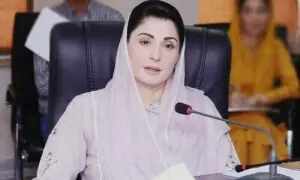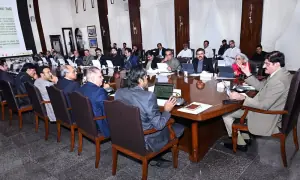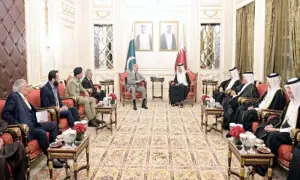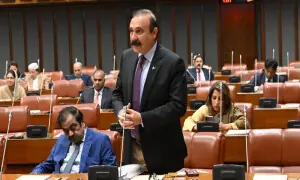Finance Minister Muhammad Aurangzeb not running economy, claims journalist
3 min readFinance Minister Muhammad Aurangzeb is not running Pakistan’s economy, journalist Shahbaz Rana has claimed amid the big role of his predecessor in key decision-making committees.
“Talking to opposition comes on a later stage thing. The PML-N should first install its ‘A-Team’ to run the country,” he said while appearing on Spotlight with Munizae Jahangir which was aired on Aaj News on Tuesday.
“Effectively, 60% to 70% of the economy is being run by Deputy Prime Minister and Foreign Minister Ishaq Dar. Finance Minister Muhammad Aurangzeb is not running it.”
Dar was given the additional charge of DPM in April, more than a month after he was sworn in as the FM. When the PML-N announced its decision to form the government after the elections, political pundits thought that the finance department would go to Dar as he has served in a similar capacity in the past.
But PM Shehbaz broke this chain and brought former banker Aurangzeb to the key position. Reports said that Dar, who is also a relative of the Sharif family, had concerns over the development.
It was not just his accession to the position; later, he was made head of the key committees, including the Executive Committee of the National Economic Council, which was supposed to be headed by the finance minister.
“Many committees, including taxation, subsidy, and gas, are being headed by Dar,” Rana said.
When asked, the journalist explained that Aurangzeb’s face was good for the International Monetary Fund and the World Bank while matters in the country were being handled by the DPM.
He clarified that the inflation was not down, only the pace of inflation was down from 30% to 8%.
Rana, the Express Tribune’s economic correspondent, was of the view that the Rs12 per unit relief on electricity bills for three months would not happen because the government cannot lessen taxation.
He revealed that the impact of renegotiated contracts with the independent power producers (IPPs) “is not even Re1 per unit.” Contrary to this, he said that the government should end the cross-subsidy and take expenses from its budget for electricity relief.
The journalist clarified that the stock market “is not the exact parameter” of Pakistan’s economy. “This is not a thermometer from where you see Pakistan’s situation. Firstly, it is not reflective of the whole economy and has no depth.”
He explained that no companies are listed that could take loans by selling equity. “Some brokers influence the stock market. Most of the time there is a political angle on shares going up. Sometimes it is said they are motivated to lead stocks in a particular direction.”
Rana claimed that it was the government’s target to cross the KSE-100 index above 100,000 which the brokers did. He mentioned that there was a bloodbath last week where 4,800 points fell in a day.
Also, read this
Saudi Arabia extends term of $3b deposit with Pakistan for another year
Shabbar Zaidi calls for ending ‘supremacy of one province’ to improve NFC Award
“Uncertainty ended to a great extent after Pakistan entered the IMF programme,” he said and added that it takes time to translate the decisions in people’s lives.
He was of the view that there would be a painful phase of one to two years where there would be no growth. “When the government tries to bring growth and improve lives, fundamentals of the economy will not be good and it will have problems. This is a difficult path for the government.”
Rana added that Pakistan’s foreign policy was linked to its economic ties with the IMF and Saudi Arabia. “I don’t think Pakistan can have a foreign policy where its alignment cannot be with Saudi Arabia.”
For the latest news, follow us on Twitter @Aaj_Urdu. We are also on Facebook, Instagram and YouTube.





















Comments are closed on this story.